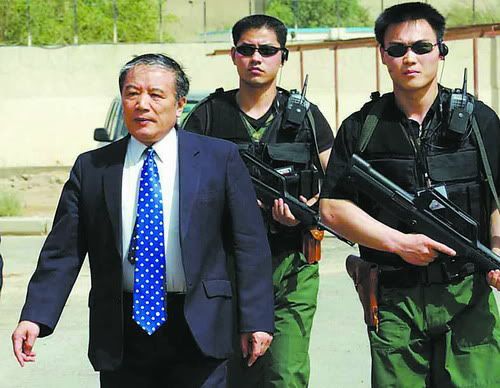Ashton’s €15-million-a-year special security budget is tiny compared to what member states shell out. According to foreign office figures provided to EUobserver, the UK between mid-2006 and mid-2010 spent €196 million on private security in Iraq alone.
Excellent news for the guys across the pond. In this article they list a bunch of the PSC’s that the EU uses in it’s foreign missions. It also lists the countries that they are using private security in.
The list of companies and the countries goes as follows:
Page Group: Afghanistan
Argus: Haiti, Lebanon, Libya, Yemen and Saudi Arabia.
Control Risks: Israel.
Saladin: Pakistan.
*The EU foreign corps last year put Argus and Page, as well as French company Geos, Canadian firm GardaWorld and British company G4S on a special shortlist. The listing means that if a new job comes up, the EEAS can hire one of them in a decision which takes just two weeks, instead of a year-or-so, as with a normal EU tender.(from article below)
Very cool and I didn’t know that Argus was such a player in this game? Here is a clip from their bio page:
Over time the company has specialized in protection, risk assessment and crisis management for international corporations and their foreign branches, but also for international organizations and diplomatic entities located in volatile countries.
Shortly before the end of the conflict in Bosnia and Herzegovina, the company established its business in Budapest, Hungary for strategic and geographic reasons. However, 97% of its activities are currently conducted outside of the European Union.
Argus Security Projects Ltd. currently has 600 staff members permanently deployed worldwide.
What I also like about this list of companies, to include the short list, is that you get an idea as to what the EU thinks is an acceptable company to work with. Both in cost, reputation, experience and capability. Although I will save my judgement on these companies, just because they could have been chosen because they are the cheapest?… It also shows what countries the EU has interest in and that they are compelled to hire private security to accomplish that mission.
The Saudi Arabia mission is obvious for it’s oil. Places like Libya have oil too, and Europe needs that oil bad. So getting into that country and securing their folks while they do their thing is a priority–all so they can influence and get a place at the ‘trough’ there. Before the revolution in Libya, Europe had a high amount of oil imports from Libya, and I imagine that they would like to get that back. Not only that, but get that source back to the level of ‘secure and dependable’. That is not easy and it takes some work in the diplomacy department to get that done. Interesting stuff. –Matt
Ashton to spend €15mn on private security firms
March 9, 2012
By Andrew Rettman
Catherine Ashton’s External Action Service (EEAS) is to spend €15 million on private security firms this year as part of broader efforts to protect diplomats overseas.
The money is to cover “fully integrated security services” at its outposts in Beirut, Benghazi, Islamabad, Jerusalem, Kabul, Port-au-Prince, Ryiadh, Saleh and Tripoli.
It will spend another €35 million on hiring day-to-day security staff for the rest of its 136 foreign delegations. Some other places are also considered risky (diplomats are asked not to take families to Baghdad and Monrovia), but do not qualify for the “fully integrated” treatment.
The Afghanistan mission is currently protected by armed, company-logo-wearing ex-military types, including former Nepalese Gurkhas, supplied by London-based firm Page Group. When the EU ambassador leaves his compound, he travels in a convoy of three cars with seven bodyguards. Last year, someone took a pot-shot at his office window while he was briefing staff. In 2010, he was nearly hit by a rocket at a tribal congress.

